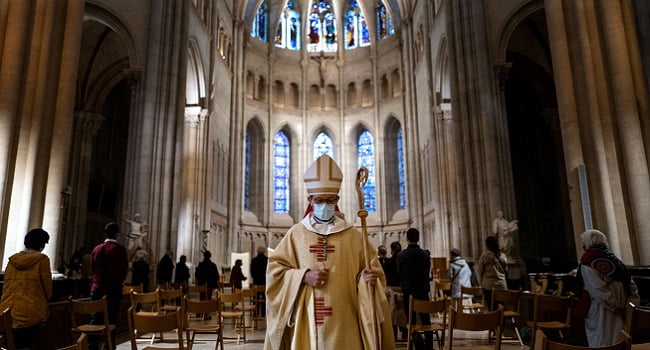
French churches were preparing to hold their first Sunday masses in more than two months after the government bowed to a ruling that they should be reopened — provided proper precautions were taken.
Nearly two weeks into the relaxation of its shutdown, the government finally allowed churches, mosques and synagogues to reopen.
Last Monday, the France’s Council of State, which instructs the government on legal issues, ordered it to lift its sweeping ban on all religious services, in place since the lockdown.
The ruling said that such a ban on freedom of worship caused “damage that is serious and manifestly illegal”, ordering the government to lift the ban within eight days.
But priests, pastors, rabbis and imams will still have to ensure that the correct safety measures are in force.
Worshippers will have to wear masks, there will have to be disinfectant gel on hand and the seating will need to be organised to ensure people keep a safe distance from each other.
“My cell phone is crackling with messages!” Father Pierre Amar, a priest in Versailles, told AFP.
At one church in Neuilly-sur-Seine, just outside Paris, some worshippers turned up at short notice Saturday morning, having heard that mass would be celebrated.
“We knew 30 minutes in advance, we ran to come,” said Eliane Nsom, who went with her three daughters. Around 40 people attended the service.
– Government caution –
France’s mosques nevertheless called on Muslims to stay at home to mark the Eid al-Fitr holiday marking the end of the Muslim fasting month of Ramadan. They said they would gradually resume services from June 3.
France’s Jewish community took a similarly cautious line. Chief Rabbi Haim Korsia stressed that believers should not “rush towards the reopening of the synagogues”.
The latest figures for those seriously ill from the virus fell Saturday, with 1,665 patients still in intensive care for the coronavirus: 36 fewer than 24 hours ago.
The death toll from the virus stands at 28,289.
But the government has had to fight a series of legal and battles to control the pace of the gradual loosening of France’s two-month lockdown.
It has refused Paris mayor Anne Hidalgo’s call to reopen the capital’s parks and gardens, over fears this could accelerate infections in the city, already hard-hit by the virus.
Heavily criticised for what critics say was their inadequate preparation in the run-up to the coronavirus crisis, the authorities have taken a caution line in handling the exit from the lockdown.
Many of its experts judge that it is too soon to say that the virus has been brought under control in France.
But some specialists, such as epidemiologist Laurent Toubiana believe that the coronavirus has already done its worst.
“A significant portion of the population may not be susceptible to coronavirus, because non-specific antibodies to the virus can stop it,” Toubiana told AFP.
The controversial microbiologist Didier Raoult has also said the dangers of a second wave of the virus have been exaggerated.
But a series of medical papers have called into question his insistence that hydroxychloroquine is an effective treatment against the coronavirus, a cure most notably promoted by US President Donald Trump.
The latest study of nearly 100,000 coronavirus patients, published Friday in the medical journal The Lancet, showed no benefit in treating them with anti-viral drugs hydroxychloroquine and chloroquine.
Such a treatment even increased the likelihood of them dying in hospital, it said.
AFP
